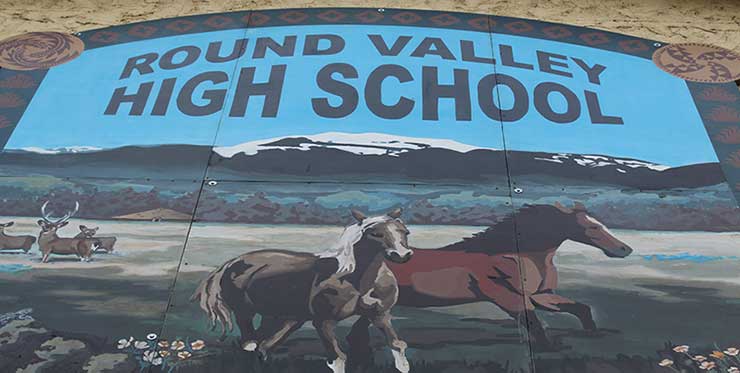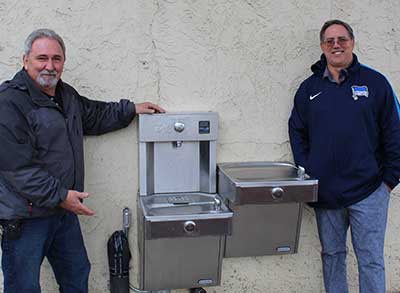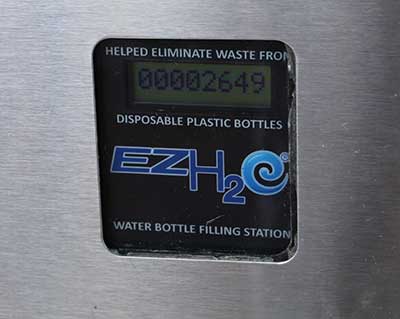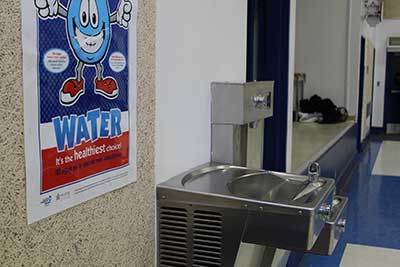
By Louis Martin, RCAC staff writer
Rural Community Assistance Corporation’s (RCAC) Agua4All program staff recently celebrated a major milestone: the first school project under the California State Water Resource Control Board’s Drinking Water for Schools (DWFS) grant. RCAC provided technical assistance to the Round Valley Unified School District in Covelo, California. The DWFS grant is itself a product of RCAC and partners’ advocacy work.
In 2014, RCAC launched Agua4All in partnership with The California Endowment. Agua4All’s original scope was to install water bottle filling stations, educate children on the importance of drinking water and conduct public outreach and build public-private partnerships. Agua4All quickly gained support from more than two dozen private and nonprofit groups as it completed major projects in California’s Kern County and Eastern Coachella Valley.
At the same time, RCAC spearheaded the Drinking Water Advocates (DWA) group, which included California technical assistance providers and public health advocates. During 2016, the group successfully secured $10 million in Gov. Brown’s budget to create the Drinking Water for Schools grant program to increase access to safe drinking water in schools throughout the state by installing water bottle filling stations and interim solutions for schools with contamination issues. The state designated RCAC as the lead technical advisor to the grantees, starting with Round Valley, the first district to complete a project under the state’s grant program.

Round Valley’s elementary and high schools installed 10 water bottle filling stations. Mike Gorman, the Round Valley district superintendent, and Mike Gonyea, the director of maintenance and operations, installed the stations themselves while RCAC’s Stephanie Villegas, Mila Spitsyn and former employee Amber Guerra provided technical support.
Covelo is seated at a high elevation in Mendocino County, more than an hour’s drive from nearby towns like Willits and Laytonville. With a population of fewer than 2,000, Covelo is part of the Round Valley Indian Reservation, a confederation of seven California Tribes. Sixty percent of the K-12 students in Covelo are Native American. Tribal inspired art dots the various buildings on both campuses, and Covelo is one of the few high schools in America to offer Native American languages (Yuki and Wylaki) for college prep credits. Gorman says the town is small, but busier than one might think.
“There’s a lot going on here, believe it or not. For a small community, we have a lot of activities. You’ve got open mic night every last Thursday of the month. The radio station puts on events. You have farmer’s markets every Friday night. We have rodeos. The Tribes put on an annual celebration,” Gorman says.
The high school is finishing construction on an impressive $7 million gymnasium project. But next to this addition are structures built several decades ago, which the staff often work on themselves to maintain and improve. The district’s aging infrastructure provides challenges. Covelo’s water is clean and safe to drink, but the appearance and age of the school’s old fountains often meant they didn’t get used. Round Valley wanted new fountains for the students, not just for drinking but for filling their water bottles.
With Covelo’s geographic isolation and mountainous conditions, bringing in outside contractors can be a huge and expensive undertaking. This isolation and aging infrastructure fostered a spirit of self-reliance in the school staff. Gonyea has more than 30 years of experience in everything from construction to farming. During his career at Round Valley, he was often a jack-of-all-trades, performing maintenance, construction, and demolition and renovation projects.
So, when the original proposals for new water bottle filling stations called for outside contractors to bid on installation, Round Valley staff took one look at the prices (about $20,000 for a single water station) and immediately knew they could do better. Gorman and Gonyea leveraged local hardware and material stores to cut costs and save on labor, which also kept funds in their community.
“We actually ended up putting in twice as many fountains at half the cost of their original proposals,” Gorman said.

Guerra traveled to Covelo to assess the campuses and make recommendations on ideal locations for the new stations. The new water stations were then placed at key points on campus such as outside gyms. They are stainless steel and have mechanisms inside to keep water chilled. As an added bonus, each station displays the number of water bottles saved through its use—the filling stations have already saved thousands of bottles from the landfill after less than a year. Because Gonyea installed the units himself, he knows their inner workings, and quickly gives visitors a rundown on how they work and why installing them in a certain location was ideal. In some cases, he even poured concrete walkways for better access. There is a real sense of pride in the work.
Completing the stations brought new challenges. If there was a tradeoff to not hiring contractors, it was the billing process. Benchmark reports had to be submitted to the state on time, and every dollar amount had to match up. Gorman says navigating the state’s complex billing process is when they realized they couldn’t do it all themselves.
“All these invoices, sheets that we had to fill out and submit. We tried it, but it’s just really hard. Especially with our jobs, [Mike Gonyea] is busy, I’m busy,” Gorman says. We’ve got a million things to do so it’s really nice to have somebody on the ground that understood that whole process.”
That somebody was Villegas, of whom both Gorman and Gonyea speak of with reverence. Villegas stepped in to help under the technical assistance contract. For Covelo staff, having someone that they could simply hand over the information and trust that it would get to the right place, in the right way, at the right time was a huge weight off their shoulders.

In addition to technical support, Villegas and Spitsyn visited Round Valley to speak to students about the importance of water to their well-being, both in school and play. Gorman says their visit made a real impact on students: the water stations are kept clean and the children treat them respectfully. Even months after their visit, one can still spot the Agua4All mascot, Wally the Water Droplet, on posters and stickers that dot both campuses.
The Round Valley project may be complete, but for Agua4All the work is just beginning. Covelo was the first of 76 school districts awarded DWFS funds, many of which will receive RCAC technical support. The State Water Resources Control Board is readying for a “round two” to distribute the additional $6.8 million in budgeted funds. The additional funding round will prioritize schools with impaired water quality.
Additionally, the state is working to allocate $2.5 million for eligible schools with water quality issues to purchase bottled water for students and staff as an interim solution, until point-of-use filters and other sustainable solutions can be implemented.
Meanwhile, Agua4All continues its work in rural, disadvantaged and Tribal communities. The program has expanded well beyond its 2014 pilot and Agua4All’s team is pleased with the project’s growing scope. Its success has gained national attention, and similar programs have launched in other regions. RCAC is a member of Rural Community Assistance Partnership (RCAP), a national network of regional agencies that serve the country. The national RCAP office has partnered with Waterboys.org to expand the program and Communities Unlimited, an RCAP affiliate serving seven southern states, launched its own Agua4All program in late 2019.
Feature photo: Mural on the front wall at the Round Valley High School.
All photos taken by Louis Martin.
